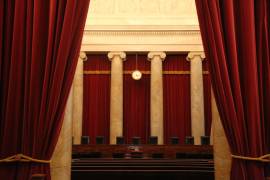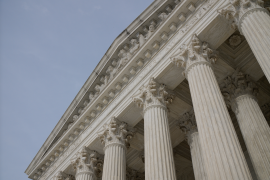Today, Lambda Legal sent a letter to the Senate Judiciary Committee urging the members to oppose Judge Amy Coney Barrett, President Trump’s nominee to fill the seat of the late Justice Ruth Bader Ginsburg on the United States Supreme Court. The rushed confirmation hearings are scheduled to begin on Monday, October 12, while voting for the next president and one-third of the senate is already underway.
“Judge Amy Coney Barrett’s record is filled with red flags that should disqualify her from sitting on the U.S. Supreme Court. Given her perverse, reactionary judicial philosophy, Judge Barrett is unfit to fill the seat, much less the shoes, of the late Justice Ruth Bader Ginsburg,” said Sasha Buchert, Senior Attorney at Lambda Legal. “Furthermore, this rushed confirmation process undermines the integrity of the Court and betrays the legacy of Justice Ginsburg. The politically motivated decision of the Senate Judiciary Committee to rush this confirmation process will further jeopardize the reputation of the Court, which must have the respect and confidence of the people in order to be effective. Our country cannot afford having the Supreme Court be seen as just another political branch—unbalanced and wielding disproportionate power.
“There is so much at stake for LGBTQ people and everyone living with HIV right now because so much of our civil rights progress has happened in the courts,” Buchert added. “Decades of hard work have led to legal victories such as the right to marry the person we love, to protect our families, to access health care and make decisions about our bodies. Judge Amy Coney Barrett’s record is fundamentally at odds with basic guarantees of equality, liberty, justice and dignity under the law for our communities. It is impossible for LGBTQ people to have confidence in Judge Barrett as her publicly available record makes clear that she would be unable or unwilling to respect and affirm our rights to equal protection of the laws.”
In 2016, then-Professor Barrett gave a presentation in which she expressed that marriage should not be viewed as a fundamental right for same-sex couples and instead should be decided on a state-by-state basis. This approach mistakenly erases the duty of courts to enforce everyone’s constitutional rights. If followed, it would deny equal liberty, dignity and autonomy to LGBTQ people, women, racial minorities and any other marginalized community historically denied those rights.
In a lecture discussing issues that could soon be before the Supreme Court, then-Professor Barrett took the troubling and legally unsound position that transgender people are not protected by federal protections against sex discrimination. Justice Gorsuch explained why her view is wrong in the Court’s Bostock v. Clayton County decision of this past June. More disturbing yet, she mischaracterizes transgender people. She has opined that “people will feel passionately on either side about whether physiological males who identify as females should be permitted in bathrooms especially where there are young girls present.” This ill-informed misgendering and disrespect of transgender people, and in particular of trans youth, ignores that it is transgender people who are at widespread risk of assault and discrimination. Spreading such inflammatory ignorance is dangerous to their very lives and ability to fully participate in public life.
Further analysis of Amy Coney Barrett’s record reveals opinions that would immediately threaten the Affordable Care Act—which has expanded health care coverage for more than 20 million people, and helped countless LGBTQ people and those living with HIV who are more than twice as likely to be uninsured. She also has showed her lack of concern for racial equity – an important duty of our federal courts – when she denied rehearing of a decision that allowed a company to segregate its employees by race, violating a core tenant of Brown v. Board of Education.





